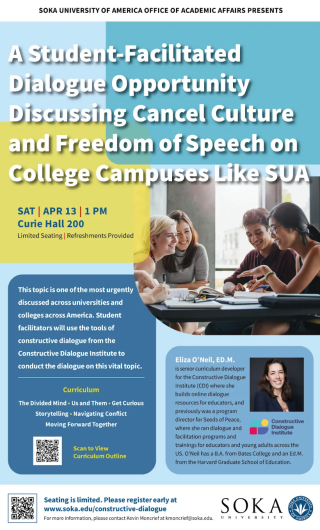
Past Event Reflection
First of all, I would like to show my deepest gratitude to Dr. Kevin Moncrief (the coordinator of Dialogue Lab), Eliza O’Neil (the president of the Constructive Dialogue Institute; CDI), student-facilitators, and many attendants, all of whom provided support and made the first student-led dialogue event possible. Thanks to all of their support, I was able to play a role as a facilitator of one discussion table.
Eliza conducted training on dialogue facilitation for several students, including me, and on the next day, we put it into practice during the campus-wide discussion about Free Speech and Cancel Culture. Many students participated in this discussion addressing these sensitive topics. I realized that this type of discussion about those controversial but familiar issues is an opportunity to listen to each other and share different points of view. Among many definitions of dialogue, the Constructive Dialogue Institute (CDI) defines it as “a form of conversation where people with different perspectives try to understand each other—without giving up their own beliefs—in order to work together.” As a facilitator, I appreciated the participants at my table, for they honestly shared their voices, thoughts, and insights.
That was the first event that Dialogue Lab organized. Thanks to feedback from the attendants as shown in a picture, we facilitators found a lot of room for improvement. For example, the dialogue event accommodated more students than we expected, and the number of dialogue facilitators was very limited. I wish we could have had more facilitators in the event so that each discussion group became smaller in size and each student had more chances to speak up.
Also, this is what I reflected with Eliza after the event, but the discussion time was so short that we could not share our stories related to the topics. In my discussion group, we were able to point out many problems about Cancel Culture and Freedom of Speech, but we could not deeply dive into why each of those problems was important for each of the discussants. The discussion could have been even more resonant if each participant could have had more time to share these personal aspects of the issues like stories. Storytelling and more open-hearted dialogue are what we can focus on more in future dialogue events. I hope this makes sense…!
In my opinion, overall, holding that kind of discussion event on those sensitive topics (i.e. Free Speech & Cancel Culture) was very meaningful. Generally speaking, there are few opportunities in our daily lives for people to openly discuss those sensitive issues, although they are somewhat relevant to our lives.
At the same time, I believe that dialogue on controversial topics is very difficult. The more sensitive topics are, the stronger ideas people tend to develop on the topics based on their experiences and values. However, no matter how strong their ideas are, they cannot impose their ideas on others or overwhelm others in dialogue because dialogue is based on mutual respect and patient listening. In dialogue, while people may need to courageously speak up about their faith, they are often challenged to know others better, find common ground, and think out of the box toward mutual understanding. Therefore, I have been struggling to have a dialogue that needs so much wisdom, courage, and compassion.
— Kenta Okazaki ‘24
